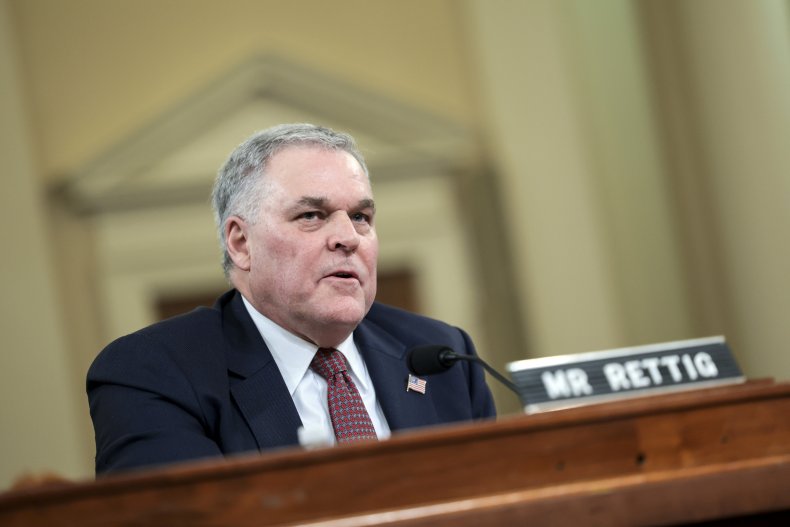The Internal Revenue Service (IRS) removed the requirement that special-agent applicants carry firearms and "be willing to use deadly force" from a job listing.
Documentarian Ford Fischer tweeted a screenshot of the IRS careers website, which included mentions of "irregular hours" and being on-call 24 hours in addition to holidays and weekends. It also cited the IRS' Criminal Investigation team—described as "the law enforcement branch of the IRS"—which requires special agents to "combine accounting skills with law enforcement skills to investigate financial crimes."
The IRS is hiring new special agents!
— Ford Fischer (@FordFischer) August 10, 2022
Requirements include working min “50 hours per week, which may include irregular hours, and be on-call 24/7, including holidays and weekends” and “Carry a firearm and be willing to use deadly force, if necessary.”https://t.co/uvwbrAkIit pic.twitter.com/z0aVX6uoMr
At the time of Fischer's tweet, the IRS website's job description for special agents included the requirement that they be able to carry a firearm and be willing to use deadly force if necessary. However, as of Friday morning, the listing had been edited to omit those two requirements.
Josh Cole, communications director for the IRS, told Newsweek via email that the change was "minor" and on only one page of the IRS website regarding the 1811 special agent job posting.
"The underlying job announcements for special agents, which have been posted on USAjobs.gov since February, did not change," Cole said. "The wording change on one webpage followed continued misstatements and inaccuracies about IRS employees carrying weapons. In reality, only a small fraction of IRS employees—about 2,100 special agents in IRS Criminal Investigation—carry firearms. This is consistent with other federal law enforcement agencies."
As the sixth-largest law enforcement agency in the country, Cole added it's not uncommon for special agents to carry firearms with proper training. That is due to investigating criminal tax violations and other related financial crimes, including money laundering, bank secrecy, national security and national defense matters.
The IRS has been under intense scrutiny lately, particularly by conservatives who believe that the Inflation Reduction Act being deliberated in the House will increase the number of agents by about 87,000.
"When people realize most of these IRS agents will not be going after billionaires and big companies—but will instead be auditing waitresses, Uber drivers, self-employed people, and small businesses—I expect the opposition will grow even more intense," former House Speaker Newt Gingrich wrote in a Newsweek op-ed.

House Minority Leader Kevin McCarthy, without substantiation, tweeted that the "Democrats' new army of 87,000 IRS agents will be coming for you—with 710,000 new audits for Americans who earn less than $75k."
Republican Congresswoman Marjorie Taylor Greene of Georgia tweeted, "They're buying more guns & ammo too. Lower to middle-income Americans & small businesses will be the primary targets of Democrat's new IRS force."
The Republican National Committee has also seized on the legislation, calling it "The Bidenflation Scam Bill," echoing McCarthy's use of the word "army" in reference to IRS agent funding.
The 87,000 number of new agent alludes to a figure mentioned in a May 2021 Treasury Department analysis of how the IRS would utilize $80 billion in resources, mentioning the potential addition of 86,852 new full-time agents to curb ground lost within the past decade.
"During this time, the IRS budget fell by about 20 percent, leading to a sustained decline in its workforce particularly among specialized auditors who conduct examinations of high-income and global high net worth individuals and complex structures, like partnerships, multi-tier pass-through entities, and multinational corporations," the assessment reads.
In March of this year, IRS Commissioner Charles Rettig discussed IRS employment and hiring before the House Ways and Means Committee.
"Over the next six years, we estimate we will need to hire 52,000 employees just to maintain our current levels," he said. "This estimate is based on a reduction in the workforce of approximately 35,000 through retirement and 17,000 through non-retirement attrition.
In an August 4 letter to the Senate, Rettig wrote that "these resources are absolutely not about increasing audit scrutiny on small businesses or middle-income Americans," adding that audit rates would not rise "relative to recent years" for households making under $400,000.
"Other resources will be invested in employees and IT systems that will allow us to better serve all taxpayers, including small businesses and middle-income taxpayers," he continued. "Enhanced IT systems and taxpayer service will actually mean that honest taxpayers will be better able to comply with the tax laws, resulting in a lower likelihood of being audited and a reduced burden on them."
In an August 10 written response to Rettig, Treasury Secretary Janet Yellen wrote that the Inflation Reduction Act "includes much-needed funding for the IRS" in multiple facets and that such "crucial investments have been a focus of the Biden Administration since the President's first day in office."
She also stressed the need for the $400,000 figure to be honored.
"Specifically, I direct that any additional resources—including any new personnel or auditors that are hired—shall not be used to increase the share of small business or households below the $400,000 threshold that are audited relative to historical levels," Yellen wrote.
"This means that, contrary to the misinformation from opponents of this legislation, small business or households earning $400,000 per year or less will not see an increase in the chances that they are audited."
Update 08/15/2022, 5:25 p.m. ET: This article has been updated with a statement from Josh Cole, communications director for the IRS.








